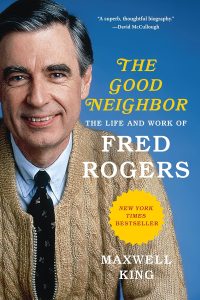 Summary: Fred Rogers was the person the person you saw on tv.
Summary: Fred Rogers was the person the person you saw on tv.
It is surprising that it has taken 15 years since his death for an actual biography of Fred Rogers to be written. At the end of the book, the author Max King, says that the family took a good bit of convincing to participate in the biography because Mr Rogers had been resistant to a biography when he was alive. Max King convinced the family of the need for a biography, not because he wanted to be the one to write it, but because he understood the importance of a good biography to legacy of Mister Rogers. Once the family was convinced of the need, they wanted King to be the author.
The Good Neighbor is Max King’s first book. he was a journalist for 30 years culminating in being the editor of the Philadelphia Inquirer from 1990 to 1998. Then he became the President of the Heinz Endowments, which helped to fund of the Mr Rogers programming. When he retired from the Heinz Endowments in 2008 he was asked to lead The Fred Rogers Center for Early Learning and Children’s Media at St Vincent College where he is still a fellow. From his position at the Fred Rogers Center he was able to see the importance of Mister Rogers legacy and be in a position to write with access to both documentary evidence and people that were around Fred Rogers.
The Good Neighbor was released on the same day that the documentary Won’t You Be My Neighbor was released to DVD/Blu-ray home sales. I did not see the documentary in the theater, but I have now watched it three times since the digital release. Max King is one of the figures that was interviewed on the documentary. These two projects, along with the Tom Hanks feature film on Mister Rogers that is scheduled for release in 2019, coincide with the 50th anniversary of the start of Mister Rogers Neighborhood.
The Good Neighbor is traditional in biographical form. It traces Fred Rogers’ family history, his childhood, teen and college years and early TV career in a fairly straight line. Once the Mister Rogers’ Neighborhood starts its main production the straight line narrative breaks down and never really fully comes back together. As I was reading I kept thinking about Walter Isaacson’s biography of Steve Jobs. In a somewhat similar way to Steve Jobs, Fred Rogers was so completely identified with his work that it is virtually impossible for a biographer to write without long discussions of that work. The Steve Jobs biography discussed the company and the products, the Good Neighbor discusses not just the production of the show and the structure of what became his non-profit production company, but also his work in childhood development, puppetry, the rise of PBS and many other topics that were informed by Fred Rogers but were more than just biography.
In my review of Flannery O’Connor’s Everything that Rises Must Converge and the new biography of Madeline L’Engle, A Light So Lovely, I discussed the importance of Christians telling honest stories about our heroes or predecessors and not falling into the trap of hagiography. Max King does not fall into the trap of hagiography here. There is significant respect for Fred Rogers. And if there is a single theme of The Good Neighbor, it is that Fred Rogers was fundamentally what we saw when we watched Mister Rogers, a person that cared significantly for those around him. The Good Neighbor does not present Fred Rogers as a saint. He made mistakes, he was not a perfect parent. His objection to being the subject of attention and resistance to licensing toys and advertising have probably limited the reach of Mister Rogers’ Neighborhood in a way that Sesame Street has not been limited.
But another theme that also carries through The Good Neighbor, is that Fred Rogers was driven by faith in his work. This is not a “˜Christian biography’ and I have no idea of what Max King’s religious background is, but Fred Rogers’ faith is throughout the book because Christianity was part of what made Fred Rogers into the person that we saw on Mister Rogers. The two previous semi-biographical books on Mister Rogers that I have reviewed here, Peaceful Neighbor and The Simple Faith of Mister Rogers were more explicitly about Fred Rogers’ Christianity, but in the Good Neighbor, his faith carries throughout.
There is some repetition of stories and ideas that I think could have been cleaned up with more editing, but on the whole this is a well written biography and one that I would recommend to anyone with an interest in Fred Rogers. I was glad I watched the documentary before I read the biography. As much as I love the documentary, the fuller picture of biography is very helpful. A two-hour overview of Mister Rogers cannot rise to the level of detail of a 320 page biography. There are several places where the documentary seems to gloss over details in a way that when handled by the biography seem to be almost a misrepresentation.
My children are exactly the age that Mister Rogers’ Neighborhood targeted. In the last month my children and I have watched many episodes. My four year old does not like how some episodes Fred Rogers has dark hair and some he has gray hair; she prefers the older Mister Rogers. But that peaceful pacing and direct conversation to the audience and direct confrontation of difficult issues (the show covers war, divorce, death, assassination, racism, etc) has made me happy to turn on the TV to my children’s requests to watch the show.
The Good Neighbor: The Life and Work of Fred Rogers by Maxwell King Purchase Links: Hardcover, Kindle Edition, Audible.com Audiobook